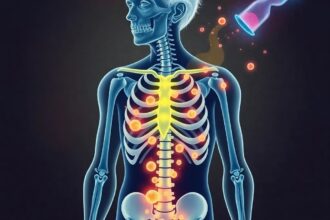Explore how autophagy, the body’s cellular recycling process, prevents diseases like cancer and neurodegeneration, and learn how lifestyle choices can enhance this vital function.
Autophagy, the body’s natural process of cellular recycling, plays a crucial role in preventing diseases and maintaining overall health.
Understanding Autophagy: The Science Behind Cellular Recycling
Autophagy, derived from the Greek words for ‘self’ and ‘eating,’ is a fundamental cellular process that involves the degradation and recycling of damaged or unnecessary cellular components. This process is crucial for maintaining cellular homeostasis and preventing the accumulation of toxic substances that can lead to disease. According to Dr. Yoshinori Ohsumi, who won the Nobel Prize in Physiology or Medicine in 2016 for his discoveries in autophagy, Autophagy is essential for cellular survival and plays a critical role in preventing diseases such as cancer and neurodegenerative disorders.
The Role of Autophagy in Disease Prevention
Research has shown that autophagy is a key player in preventing various diseases. For instance, in cancer, autophagy helps to remove damaged cells that could potentially become cancerous. A study published in the journal Nature found that autophagy acts as a tumor suppressor by eliminating damaged cells and preventing the accumulation of mutations that can lead to cancer.
Similarly, in neurodegenerative diseases like Alzheimer’s and Parkinson’s, autophagy helps to clear out toxic protein aggregates that contribute to disease progression.
Lifestyle Factors That Influence Autophagy
Several lifestyle factors can influence the rate and efficiency of autophagy. Fasting, for example, has been shown to significantly enhance autophagy. A study conducted by researchers at the University of Southern California found that fasting for 24-48 hours can trigger a robust autophagic response, leading to the removal of damaged cells and the promotion of cellular renewal.
Exercise is another powerful inducer of autophagy. A 2012 study published in Cell Metabolism demonstrated that regular physical activity increases autophagy in muscle cells, improving muscle function and reducing the risk of metabolic diseases.
Nutritional Support for Autophagy
Certain nutrients and dietary patterns can also support autophagy. Polyphenols, found in foods like green tea, berries, and dark chocolate, have been shown to enhance autophagy. A 2018 study in the journal Nutrients reported that polyphenols can activate autophagy pathways, leading to improved cellular health and reduced inflammation.
Additionally, a ketogenic diet, which is high in fats and low in carbohydrates, has been found to promote autophagy by mimicking the effects of fasting.
Therapeutic Applications of Autophagy
The potential therapeutic applications of autophagy are vast. Researchers are exploring ways to harness autophagy to treat diseases such as cancer, neurodegenerative disorders, and infections. For example, a 2019 study in Science Translational Medicine found that activating autophagy in cancer cells can enhance the effectiveness of chemotherapy by promoting the death of cancer cells.
Similarly, in neurodegenerative diseases, drugs that enhance autophagy are being investigated as potential treatments to slow disease progression.
Practical Tips for Supporting Autophagy
To support autophagy through lifestyle choices, consider incorporating intermittent fasting, regular exercise, and a diet rich in polyphenols and healthy fats. Dr. Valter Longo, a leading researcher in the field of fasting and longevity, recommends periodic fasting or time-restricted eating as a practical way to enhance autophagy and promote overall health.
Additionally, staying hydrated, getting adequate sleep, and managing stress are important factors that can influence autophagy.
In conclusion, autophagy is a vital cellular process that plays a key role in preventing diseases and maintaining overall health. By understanding the science behind autophagy and making informed lifestyle choices, individuals can support this essential process and improve their long-term health outcomes.




